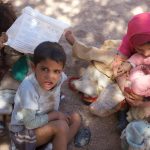IFPRI’s 2020 Annual Report presents highlights from our research work around the world. Cutting-edge research on the impacts of the COVID-19 pandemic and related policies, and on our strategic research areas—climate resilience and sustainability, healthy diets and nutrition, inclusive and [...]
Investment in agricultural research key to offsetting climate change impacts
Channing Arndt - Director of IFPRI's Environment and Production Technology Division
Shenggen Fan - Director General of IFPRI
Nick Austin - Director, Agricultural Development, within the Global Development Division at the Bill & Melinda Gates Foundation.
On Sept. 23, the Bill & Melinda Gates Foundation, the World Bank, the United Kingdom, the Netherlands, the European Commission, Switzerland, Sweden, and Germany announced commitments of more than $790 million to address the impact [...]
Policy Brief: Responding to conflict: Does “Cash Plus” work for preventing malnutrition? New evidence from an impact evaluation
Sikandra Kurdi, Clemens Breisinger, Hosam Ibrahim, Yashodham Ghorpade, Afrah Al-Ahmadi
An impact evaluation of Yemen’s Cash for Nutrition program provides new evidence of the benefits of “cash plus” transfer programs to meet nutritional needs in conflict situations.
Publication: Beyond the business case for agricultural value chain development: An economywide approach applied to Egypt
Clemens Breisinger, Mariam Raouf, James Thurlow, Manfred Wiebelt
This paper goes beyond the “business” case for agricultural value chain development and presents an economy-wide framework to make the “development” case. We show that there are several key transmission channels that determine the economy-wide impacts of promoting various value chains, including forward and backward economic linkages, price responses, and net employment effects.
Publication: Can unconditional cash transfers mitigate the impact of civil conflict on acute child malnutrition in Yemen?
Olivier Ecker, Jean-François Maystadt, Zhe Guo
Hunger and acute child malnutrition are increasingly concentrated in fragile countries and civil conflict zones. According to the United Nations, Yemen’s civil war has caused the world’s worst humanitarian crisis in recent history. We use high-frequency panel data and district fixed-effects and household fixed-effects models to estimate the impact of civil conflict on child nutrition.





